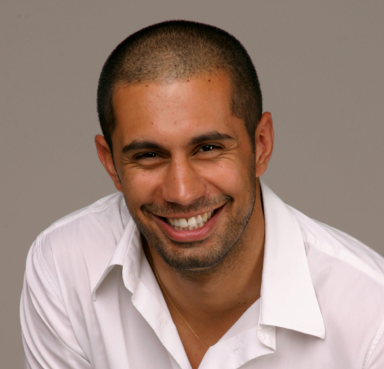
By Gregory Pouy, {grow} Community Member
When I was asked to write the piece about Twitter, I wondered what personal insight I could share about my love for this social media platform. Despite the raging debate about the value of Twitter, I believe Twitter ROI does indeed exist in the real world. So I want to provide an example of Twitter facilitating important connections between people in the real world (it even involves Mark).
A few years ago, the Pittsburgh Steelers were playing the Dallas Cowboys. Like many Americans, Mark was following the Steelers, his favorite football team. The game was in full swing, and Mark took to Twitter to ask if any of his followers were Steeler fans. As people chimed in with their thoughts on the game, a young woman named Michelle joined the discussion. She was studying at the University of Pittsburgh, and was clearly a fan of the local team.
Normally, there would be no good reason for these two people to ever meet. They weren’t the same age, they didn’t live in the same city, and they seemingly had nothing in common other than their love for the Steelers.
They chatted on Twitter, and Mark discovered Michelle’s new blog, where she posted funny videos that she produced. Mark liked her work, and he asked if she would be willing to create a video for his business. She gladly accepted and the video became a big hit. It was the start of a long friendship.
By now, you might be wondering where I’m going with this.
It’s time for me to enter the picture …
It just so happened that Michelle spoke French. In fact, she was doing a remote internship for a French company at the time. Interested in connecting with people in France, she decided to follow me on Twitter. I had just left my job and was planning a vacation in Brazil. Naturally, I asked my Twitter followers if they had any suggestions for my trip to this wonderful country.
Michelle had just come back from a one-year exchange program with a Brazilian university in Salvador de Bahia. She had fallen in love with the country and knew it pretty well, so she was full of helpful suggestions for my trip. We kept in touch after my vacation, and met up in person when she visited France.
In 2009, I was planning a party to celebrate the fifth anniversary of my blog, and by now Michelle had actually moved to Paris. By coincidence, Mark and his wife were also visiting Paris at the same time. Michelle, who had never actually met him in person, invited him to the party and subsequently introduced us. Mark and I talked for a while, and we continued to keep in touch via Twitter.
The connections pay off
Over time, Mark became one of the most renowned marketing consultants and authors in the world. He saw that I had been publishing a few presentations in English via Slideshare, and asked me to contribute to his blog. I jumped at the opportunity! We were both thrilled by this collaboration; Mark liked the content, and I was happy to have the extra exposure.
Five years after my first meeting with Mark, I was contacted by Rutgers University in the US. They were looking for a social media instructor for a workshop they were sponsoring in France and had Mark recommended me.
I am planning to move to the U.S. and had a chance to meet Mark at SXSW this year to discuss business opportunities in New York … so who knows where that will go. I am making additional connections because Mark used this story at the beginning of his book The Tao of Twitter, which is the best-selling book about Twitter in the world!
So, as it turns out, that one tweet about a football game was responsible for a variety of business opportunities for the three of us, all facilitated through Twitter. Here’s what I learned from this experience:
1. Don’t dissociate “digital” and “real life”
As professionals, we often model our company’s organization after the way consumers use certain tools, so we’ll talk about “virtual relationships” and “e-commerce,” as opposed to real life.
The consumer’s experience is a fluid one; they’ll use either “virtual” or “real” interactions interchangeably according to their needs, or out of convenience. One may, for example, meet someone in real life, but later reinforce that relationship via Twitter, or vice versa.
2. Business benefits may not be “financial” in the short term
If you are desperate to determine how many conversions a given campaign generated, you are bound to make the wrong decisions. Running after short-term revenues rarely coincides with a good long-term strategy.
Management and shareholders obviously push for these type of results, but there are other tools that may be better suited for that type of strategy. Generally speaking, the social web is comprised of conversational tools that rarely help you generate short-term sales, but are better for building long-term relationships. Search and affiliation are more likely to yield short-term results.
Twitter is an amazing networking tool. It has opened the door to so many relationships who continue to create benefits in my life.
3. You’re building your greatest asset
Think about your address book or contact list, the one that took you years to cultivate. As a professional, you know that it’s one of your greatest assets. You know that you can count on your network to help you out in the most complicated personal or professional situations. Your interactions on the social web work the same way, so make sure you are using the right tool for your strategy.
Twitter is an incredible tool for managing customer relations, promoting your products, and following the discussions involving your brand. But perhaps most importantly, Twitter allows you to connect with people who may very well change your life or your business.
If you are not networking on Twitter, you might just be missing your own “Go Steelers” moment!
 Gregory Pouy is based in Paris and is one of France’s leading marketing bloggers. You can learn more about his work on Slideshare and by following him on Twitter @gregfromparis . He founded @LaMercatique, helping brands to better understand and integrate digital in their marketing strategy
Gregory Pouy is based in Paris and is one of France’s leading marketing bloggers. You can learn more about his work on Slideshare and by following him on Twitter @gregfromparis . He founded @LaMercatique, helping brands to better understand and integrate digital in their marketing strategy


